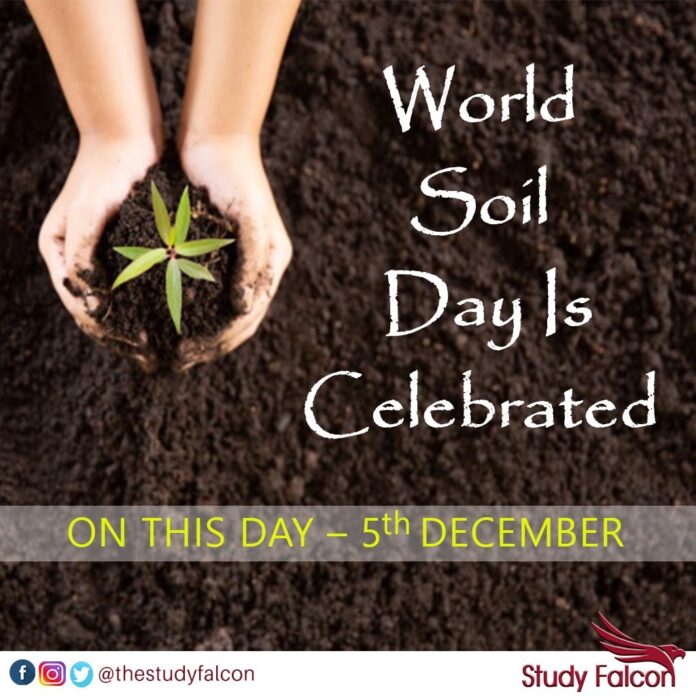World Soil Day, which is celebrated on December 5th each year, is an annual awareness day run by the United Nations Food and Agriculture Organization (FAO). The event aims to raise awareness of the importance of soil quality for human well-being, food security and ecosystems, and events.
This day is celebrated as a means to focus attention on the importance of healthy soil and to advocate for the sustainable management of soil resources for a food-secure future. The date of 5 December for WSD was chosen because it corresponds with the official birthday of H.M. King Bhumibol Adulyadej, the King of Thailand, who officially sanctioned the event. The day was first considered by the International Union of Soil Sciences in 2002, but was not officially endorsed by FAO until 2013.
Soil is home to more than 1/4 of our planet’s biodiversity. Yet, we only know 1% of this universe. There are more living creatures in a single teaspoon of healthy soil than there are people on Earth. Soil organisms are responsible for many critical ecosystem processes on which humans depend: from supporting plant growth, to storing carbon and being a vast reservoir for pharmaceuticals.
But soil biodiversity is under threat. Half of the topsoil on the planet has been lost in the last 150 years, with a staggering 26.4 billion tons of soil lost each year, a rate that is 10 times faster than soil is being replenished. Soil erosion is also a significant yet largely overlooked contributor to carbon emissions.
In support of this year’s theme – ‘Keep soil alive, protect soil biodiversity’ – Elsevier presents a curated, open access collection of over 60 journal articles to raise awareness of the importance of maintaining healthy soil ecosystems.
Healthy soil with a rich biodiversity is key for human survival and development. Most of the world’s biodiversity, over two million species, lives in the soil – mega-, macro-, meso- and micro organisms, of which only about 1% have been identified so far. All these organisms play a key role in the food chain of life on the planet, including our own as humans. When the harmony and balance in soil is disturbed and put out of sync, the fertility of the soil and the whole food chain is at risk – both in natural and in agricultural systems.
As human population has grown with the rise of modern societies and technological revolutions, the impact we have had on the environment has been increasingly adverse, including negative impacts on the soil necessary for the survival of the planet and human life. Due to deforestation, intensive agriculture, unsustainable tillage, mono-cropping, the introduction and overuse of chemical fertilizers and pesticides, and pollution, soil health is at great risk as soil erosion, desertification and soil degradation takes place.
The industrial model of agriculture is the primary driver of climate change. Fossil fuels, chemical fertilizers, and loss of organic matter in soils due to intensive cultivation and high input poisonous agrochemicals are significant sources of greenhouse gas (GHG) emissions. About 14-24 percent of anthropogenic GHG emissions are attributed to agriculture, and industrial agriculture accounts for more than 80% of the fossil fuel emissions to only produce 30% of the world’s food. Hence, this year’s World Soil Day celebration is critical to highlight how the industrial agriculture paradigm is poisoning the Soil, polluting the air and depleting biodiversity by excessive use of agrochemicals and intensive, high-input, monoculture farming.
We all depend on soil, so the more that that is understood of it, the better the human race thrives, from beautiful gardens to crops that produce our food, an example is where programmes in Africa have taught small farmers to manage soil against drought and erosion, meaning bigger and better crops and less hunger and poverty in some areas.
The UN Food and Agricultural Organisation (FAO), is focusing on addressing the serious and increasing challenges to soil management in 2020 through the campaign ‘Keep soil alive, protect soil biodiversity’. The aim is to raise awareness and to get people around the world to contribute to fight soil biodiversity loss and actively promote a soil health. “If we do not act soon, the fertility of soil will continue to be adversely affected at an alarming rate, threatening global food supplies and food safety” (FAO). Moreover, except for food, the organisms in the soil carries out and contribute to many essential common goods and ecosystem services, for example, water and air purification, storing carbon and breaking down toxins, and being a great resource for present day and future pharmaceuticals.










